上班族英语学习计划(完整版)
【个人学习计划】上班族的也可以制定每天的英语学习计划

【个人学习计划】上班族的也可以制定每天的英语学习计划
一.早晚上下班的路上,听voa慢速英语
这一个月都是练习的精听,每天只听一篇材料,基本上没听懂的内容我都会重复再听
直到听懂。
遇到不熟悉的短语,我下班后也会自己查询弄清楚。
下个月我准备开始换voa
标准语速了,这些材料可以在很多的英语网站上面下载。
二.到家后念30分钟的商务英语
基本上我7点左右会到家,到家以后收拾一下,然后会读上半个小时的商务英语,自
己买了一本双语商务英语教材,网上电子版的不方便,真正想学好英语不在乎花那么点钱。
我对自己每天的材料要求不多,有时候甚至只读不超过10个句子,但是我会尽量要求自
己背诵下来,第二天也会温习前一天的内容。
三.睡前跟著美剧练30分钟的口语
读过的内容,如果不用于实践就很快会忘记,所以学习英语要不断的练习,这段时间
我在追着《权利的游戏》,在观看的时候我都会跟读那些台词,开始是中英字幕一起读,
后来慢慢的就用纯英文来读,有时也会闭着眼睛听台词,这样学习英语听力也是非常有效的,有时学习的太过投入了,几个小时都看不完一集。
当让这也是非常有效的。
在这样一整天的时间内,你又没耽搁工作,存有自学了英语,这就是一石二鸟的事情。
只要你能坚持下去,每天都如此自学,假以时日,你的英语水平确实可以达至突飞猛进的
境界的。
上班族英语学习计划大学

上班族英语学习计划大学工作目标1.提升职场英语沟通能力为了在工作中更自如地使用英语,我将计划通过参加在线英语课程和与外国同事进行语言交换来提高我的听说能力。
此外,我还会每天阅读英文职场相关的文章和书籍,增强理解和表达能力,以便在跨文化交流中更加得心应手。
2.掌握专业英语词汇为了提升专业英语水平,我将制定一个学习计划,每天学习并记忆与我的工作相关的专业英语词汇。
同时,我会定期参加专业英语培训课程,以提高我在专业领域的英语沟通能力,使我在工作中更加自信。
3.提高英语写作能力为了提升英语写作能力,我计划每周写一篇英文文章或报告,然后请同事或朋友帮我修改。
此外,我还会参加英语写作工作坊,学习如何更有效地表达观点和想法,以提高我的职场英语写作水平。
工作任务1.制定英语学习计划为了有效地提升英语水平,我将制定一个详细的学习计划,包括每天的学习时间、学习内容和目标。
我会确保计划的可行性,并根据自己的进度进行调整。
2.参加在线英语课程和语言交换为了提升听说能力,我将在业余时间参加在线英语课程,并与外国同事进行语言交换。
这将帮助我提高语音语调和语流,增强与外国同事的沟通能力。
3.学习专业英语词汇和培训课程为了提升专业英语水平,我将制定一个学习计划,每天学习并记忆与我的工作相关的专业英语词汇。
同时,我会定期参加专业英语培训课程,以提高我在专业领域的英语沟通能力。
4.提升英语写作能力为了提升英语写作能力,我将每周写一篇英文文章或报告,然后请同事或朋友帮我修改。
此外,我还会参加英语写作工作坊,学习如何更有效地表达观点和想法,以提高我的职场英语写作水平。
任务措施1.执行每日英语学习任务每天早上,我会在通勤途中听英文播客或英语学习节目的录音,以充分利用时间。
在午休时,我会阅读英文新闻或文章,加深对英语时事的理解。
晚上,我会安排一个安静的学习环境,复习当天学习的内容,并进行英语写作练习。
2.参与线上英语学习社区我计划加入线上英语学习社区,与其他学习者交流学习心得和方法。
上班族成人英语学习计划
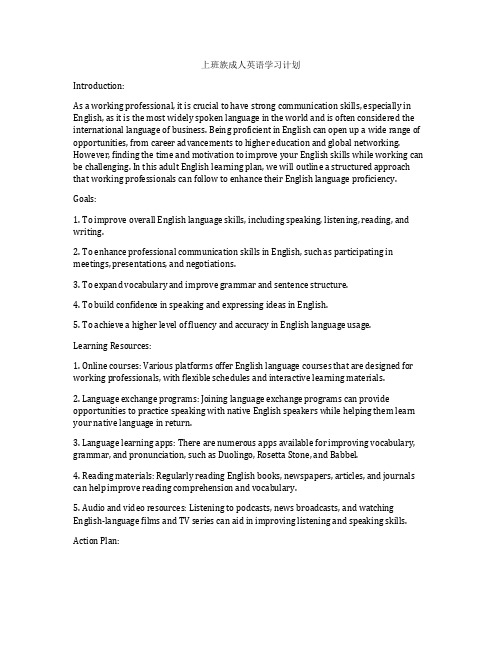
上班族成人英语学习计划Introduction:As a working professional, it is crucial to have strong communication skills, especially in English, as it is the most widely spoken language in the world and is often considered the international language of business. Being proficient in English can open up a wide range of opportunities, from career advancements to higher education and global networking. However, finding the time and motivation to improve your English skills while working can be challenging. In this adult English learning plan, we will outline a structured approach that working professionals can follow to enhance their English language proficiency.Goals:1. To improve overall English language skills, including speaking, listening, reading, and writing.2. To enhance professional communication skills in English, such as participating in meetings, presentations, and negotiations.3. To expand vocabulary and improve grammar and sentence structure.4. To build confidence in speaking and expressing ideas in English.5. To achieve a higher level of fluency and accuracy in English language usage.Learning Resources:1. Online courses: Various platforms offer English language courses that are designed for working professionals, with flexible schedules and interactive learning materials.2. Language exchange programs: Joining language exchange programs can provide opportunities to practice speaking with native English speakers while helping them learn your native language in return.3. Language learning apps: There are numerous apps available for improving vocabulary, grammar, and pronunciation, such as Duolingo, Rosetta Stone, and Babbel.4. Reading materials: Regularly reading English books, newspapers, articles, and journals can help improve reading comprehension and vocabulary.5. Audio and video resources: Listening to podcasts, news broadcasts, and watching English-language films and TV series can aid in improving listening and speaking skills. Action Plan:1. Set specific and achievable language learning goals: Define what you want to achieve in terms of English language proficiency, such as passing a certification exam, being able to conduct business meetings in English, or simply improving conversational skills.2. Schedule regular study time: Allocate dedicated time for language learning, whether it's early in the morning, during lunch breaks, or in the evenings. Consistency is key to making progress.3. Utilize commute time: Make the most of your daily commute by listening to English language podcasts or audio courses.4. Join language learning communities: Engage with other English learners, join discussion forums, or participate in language exchange meetups to practice speaking and get feedback.5. Practice active learning: Instead of just passively consuming content, actively engage with the material by taking notes, doing exercises, and speaking out loud.6. Seek feedback: Share your writing and speaking with others, whether it's a language partner, tutor, or online community, to receive constructive feedback and improve.7. Set language learning milestones: Break down your language learning goals into smaller, achievable milestones and celebrate your progress along the way.Specific Activities:1. Improve vocabulary: Learn a set number of new words every week and use them in sentences or conversations to reinforce retention.2. Enhance speaking skills: Practice speaking English regularly, whether it's by participating in group discussions, giving presentations, or simply conversing with colleagues in English.3. Practice writing: Set aside time to write in English, such as keeping a journal, writing emails, or even creating blog posts or articles on topics of interest.4. Improve listening skills: Listen to a variety of English audio materials, such as podcasts, news broadcasts, and interviews, to train your ear for different accents and speech patterns.5. Reading comprehension: Read a variety of materials in English, from fiction and non-fiction books to industry-specific articles and reports, to enhance reading comprehension and expand vocabulary.6. Grammar and sentence structure: Focus on specific grammar points and sentence structures, and practice using them in different contexts to improve accuracy and fluency. Evaluation and Reflection:1. Regularly assess your language skills to track progress and determine areas for improvement.2. Reflect on the effectiveness of different learning methods and adjust your approach accordingly.3. Seek feedback from language partners, tutors, or teachers to identify areas for improvement and receive guidance on how to address them.4. Celebrate milestones and achievements along the learning journey to stay motivated and encouraged.Conclusion:Improving English language skills as a working professional requires dedication, persistence, and a structured approach. By setting clear goals, utilizing available resources, and committing to regular practice, working professionals can enhance their English language proficiency and open up new opportunities in their careers and personal lives. This adult English learning plan provides a framework for working professionals to develop and implement a successful language learning strategy that aligns with their professional commitments and lifestyle.By following this plan, working professionals can turn their language learning goals into tangible achievements and elevate their communication skills to new heights.。
上班族英语学习计划
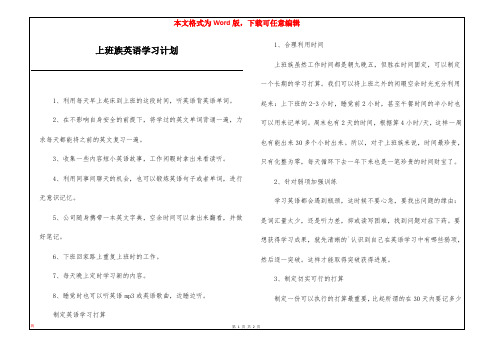
上班族英语学习计划
1、合理利用时间 上班族虽然工作时间都是朝九晚五,但胜在时间固定,可以制定
一个长期的学习打算。我们可以将上班之外的闲暇空余时光充分利用
1、利用每天早上起床到上班的这段时间,听英语背英语单词。
起来:上下班的 2-3 小时,睡觉前 2 小时,甚至午餐时间的半小时也
6一突破。这样才能取得突破获得进展。
7、每天晚上定时学习新的内容。
3、制定切实可行的打算
8、睡觉时也可以听英语 mp3 或英语歌曲,边睡边听。
制定一份可以执行的打算最重要,比起所谓的在 30 天内要记多少
制定英语学习打算
魏
第1页共2页
本文格式为 Word 版,下载可任意编辑
个单词,听多少篇听力、写多少作文等,这样的打算可执行度低,最终 完全已完成目标而完成目标,这样不仅自己觉得累也行不通。毕竟学习 英语最终目的是让自己把握这门外语。
制定打算最怕的是好高骛远,什么每天背 100 个单词、听 10 篇听 力、写 2 篇作文、读 1 小时英语打算是很好,但可行性太低。这样的打 算,只是看起来很美而已,操作起来只会很累。坚持十天半个月就会放 弃打算,不如不定。
4、报名商务英语培训课程 为了尽快提升自己的商务英语水平,报名参与商务英语培训课程就 是一个明智的选择。比方在 VIPABC,制定的英语培训课程上课时间可 以敏捷调整,并依据个人的时间预约上课,这就有效的解决了上班族学 习时间不好支配的问题。
魏
第2页共2页
2、在不影响自身安全的前提下,将学过的英文单词背诵一遍,力
可以用来记单词。周末也有 2 天的时间,根据算 4 小时/天,这样一周
求每天都能将之前的英文复习一遍。
上班族怎么做英语学习计划
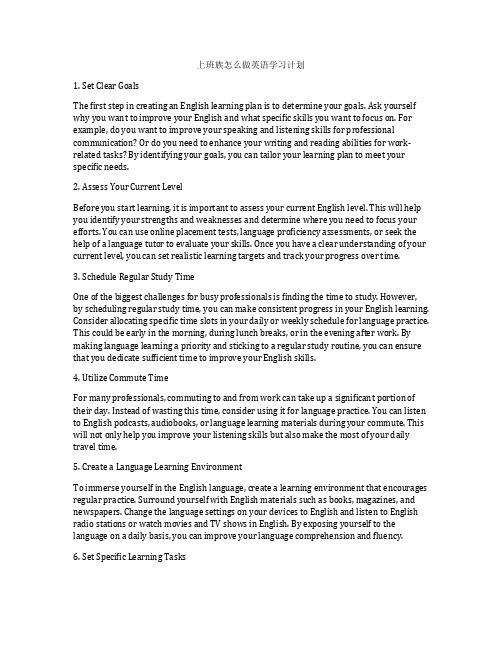
上班族怎么做英语学习计划1. Set Clear GoalsThe first step in creating an English learning plan is to determine your goals. Ask yourself why you want to improve your English and what specific skills you want to focus on. For example, do you want to improve your speaking and listening skills for professional communication? Or do you need to enhance your writing and reading abilities for work-related tasks? By identifying your goals, you can tailor your learning plan to meet your specific needs.2. Assess Your Current LevelBefore you start learning, it is important to assess your current English level. This will help you identify your strengths and weaknesses and determine where you need to focus your efforts. You can use online placement tests, language proficiency assessments, or seek the help of a language tutor to evaluate your skills. Once you have a clear understanding of your current level, you can set realistic learning targets and track your progress over time.3. Schedule Regular Study TimeOne of the biggest challenges for busy professionals is finding the time to study. However, by scheduling regular study time, you can make consistent progress in your English learning. Consider allocating specific time slots in your daily or weekly schedule for language practice. This could be early in the morning, during lunch breaks, or in the evening after work. By making language learning a priority and sticking to a regular study routine, you can ensure that you dedicate sufficient time to improve your English skills.4. Utilize Commute TimeFor many professionals, commuting to and from work can take up a significant portion of their day. Instead of wasting this time, consider using it for language practice. You can listen to English podcasts, audiobooks, or language learning materials during your commute. This will not only help you improve your listening skills but also make the most of your daily travel time.5. Create a Language Learning EnvironmentTo immerse yourself in the English language, create a learning environment that encourages regular practice. Surround yourself with English materials such as books, magazines, and newspapers. Change the language settings on your devices to English and listen to English radio stations or watch movies and TV shows in English. By exposing yourself to the language on a daily basis, you can improve your language comprehension and fluency.6. Set Specific Learning TasksTo make progress in your English learning, it is important to set specific learning tasks and objectives. This could involve learning new vocabulary, practicing grammar exercises, or working on your pronunciation. Break down your overall language goals into smaller, manageable tasks and set deadlines for completing them. This will help you stay focused and motivated, as you can track your progress and celebrate your achievements along the way.7. Seek Language Exchange OpportunitiesEngaging in language exchange activities can be a valuable way to practice your English skills. Look for opportunities to interact with native English speakers or other language learners. This could involve joining language exchange groups, attending conversation clubs, or finding a language partner for regular practice sessions. By speaking and interacting in English, you can enhance your communication abilities and gain confidence in using the language.8. Use Technology for LearningIn today's digital age, there are numerous online resources and language learning tools that can support your English study. Explore language learning apps, online courses, and interactive platforms that offer a variety of learning materials. Choose tools that align with your learning style and preferences, whether it's through flashcards, language games, or interactive lessons. Technology can be a powerful tool for enhancing your English skills and providing flexibility in your learning process.9. Practice RegularlyConsistent practice is key to improving your English language proficiency. Make it a habit to practice speaking, listening, reading, and writing in English on a regular basis. Set aside time for language drills, role-playing exercises, writing prompts, and other practice activities. The more you incorporate English into your daily routine, the more natural and effortless it will become.10. Monitor Your ProgressFinally, it is important to monitor your progress and evaluate your language learning efforts. Keep track of the tasks you have completed, the skills you have developed, and the areas that still need improvement. Regularly assess your language abilities and adjust your learning plan accordingly. Set benchmarks and milestones to measure your progress, and celebrate your achievements as you reach each goal.In conclusion, as a working professional, it is essential to create a structured and effective English learning plan to make significant progress in your language skills. By setting clear goals, scheduling regular study time, utilizing resources and technology, and engaging in language practice, you can develop a solid foundation in English and advance your language abilities. With determination and commitment, you can successfully integrate languagelearning into your busy professional life and reap the benefits of improved communication and opportunities for personal and career growth.。
上班族英语学习计划范文

上班族英语学习计划范文1. Assess your current levelBefore creating your English learning plan, it's important to assess your current level of English proficiency. This can be done through various means, such as taking an online English assessment test, speaking with a language teacher, or simply reflecting on your own strengths and weaknesses when it comes to English. Knowing where you stand will help you set realistic goals and tailor your learning plan accordingly.2. Set specific, achievable goalsOnce you've assessed your current level, it's time to set specific, achievable goals for your English learning. These goals should be SMART - specific, measurable, achievable, relevant, and time-bound. For example, you may aim to improve your English speaking skills by participating in more meetings in English, or you may want to enhance your writing skills by writing a certain number of emails or reports in English each week.3. Choose the right learning resourcesThere are countless resources available for learning English, so it's important to choose the ones that suit your learning style and goals. This may include online courses, language exchange programs, language learning apps, language schools, or private tutors. Consider your budget, schedule, and preferred learning method when choosing your resources.4. Create a study scheduleAs a working professional, finding time to study English can be challenging. However, it's essential to create a study schedule that fits into your daily routine. This may involve setting aside a specific time each day for studying, or dedicating a few hours each weekend to focus on your English learning. Consistency is key, so try to stick to your study schedule as much as possible.5. Practice, practice, practicePractice makes perfect, and this is especially true when it comes to learning a language. In addition to studying, it's important to actively practice your English skills in real-life situations. This may involve speaking with English-speaking colleagues at work, participating in English-language meetings, or engaging in everyday conversations in English. The more you practice, the more confident and proficient you'll become in English.6. Monitor your progressRegularly monitoring your progress is essential for staying motivated and making adjustments to your learning plan as needed. This may involve tracking your language skills using a language proficiency scale, keeping a journal of your language learningachievements, or seeking feedback from a language teacher or mentor. By monitoring your progress, you can see how far you've come and stay focused on your goals.7. Stay motivatedStaying motivated is one of the biggest challenges when it comes to learning a new language, especially as a working professional with many other responsibilities. To stay motivated,it's important to remind yourself of the benefits of improving your English skills, such as enhanced job opportunities, better communication with colleagues and clients, and personal growth. Find ways to make your English learning journey enjoyable, such as watching English-language movies, listening to English music, or reading English books on topics that interest you.In conclusion, creating a solid English learning plan as a working professional is essential for improving your language skills and staying competitive in today's global market. By assessing your current level, setting achievable goals, choosing the right resources, creating a study schedule, practicing regularly, monitoring your progress, and staying motivated, you can make significant strides in your English learning journey while juggling your work and personal life. With dedication and perseverance, you can become proficient in English and open up new opportunities for your career and personal development.。
上班族英语的学习计划5篇

上班族英语的学习计划5篇第一篇:上班族英语的学习计划上班人士通常都会进行通勤活动,因为他们大多都要从居住的地方来往办公地区上下班。
通常来说,他们都具有一定的学历,有稳定的收入。
下面是小编为大家精心整理的上班族英语的学习计划,希望能给您带来帮助。
1.早上起床后,打开复读机放到最大的声音听,直到离开家。
2.带着随身听,(现在别人都用MP3了)上班路上骑车听,不过要注意交通安全;或者拿着一张头天晚上写好的已学过的英文,边走边背诵,然后就自己唠叨。
每天都会先重复昨天背的,再背新的。
3.准备一本非常薄的英语故事书,工作中遇到上厕所的时候看看,或者听录音。
反正在厕所,领导也不知道。
我用的是外研社的《书虫》系列,最爱看的是《鲁宾孙漂流记》The life and strange surprising adventures of Robinson Crusoe,原因有两点,一是这本书都是以第一人称写的,比较适合于学习怎么介绍自己。
二是增强自信心,看看鲁宾孙不屈不挠的战斗精神,学习英语又能算得了什么!4.中午休息时,默写已背会的课文,收起来晚上回家对照正误。
或者趴在桌子上边睡觉边听录音。
5.和同事聊天的时候找张废纸,边聊边划拉着句子或者单词,进行无意识记忆。
一回生、两回熟。
6.在单位放本词典,没事情的时候就随意翻一篇,随便找个单词,从头到位的看例句。
有好的就摘抄下来。
我使用的是《牛津高阶英汉双解词典》。
7.下班回家路上重复上班时的工作。
8.晚上听录音学习新的内容9.找盘英语带,边睡边听。
磁带放完后,复读机自动关机,省电!我用的是“步步高”复读机,音效非常好!第二篇:上班族英语学习计划上班族英语学习计划2篇时间流逝得如此之快,前方等待着我们的是新的机遇和挑战,此时此刻需要为接下来的工作做一个详细的计划了。
我们该怎么拟定计划呢?以下是小编帮大家整理的上班族英语学习计划,仅供参考,欢迎大家阅读。
上班族英语学习计划11、早上起床后,打开复读机放到最大的声音听,直到离开家。
上班族英语学习计划范文

上班族英语学习计划范文下面是由编辑为大家整理的“上班族英语学习计划范文”,欢迎大家阅读,仅供大家参考,希望对您有所帮助。
更多文章在范文栏目,希望您关注与阅读。
上班族英语学习计划范文【一】一、学习目标:1. 3个月能用英语进行普通的口语交流,6个月能进行商务、技术类交流;2. 3个月能听懂voa慢速,6个月能听懂voa常速;3. 单词量达到5000以上;4. 能进行公文、邮件、技术应用类文章的书写。
二、学习计划:1.每天学习英语时间不小于2个小时,每周学习时间不小于12个小时。
其中,考虑出差、工作等因素,安排一天休息,学习天数每周6天,一天时间休息。
2.每天保证一定的听力的时间,至少15分钟的时间,集中注意力,并有意识地去记忆好的句子。
3.日常思考的时候,尝试用英语思考、想问题以培养语感。
4.每天早上早起7:00听一段voa或者bbc的广播新闻,可以在上班路上听,时间不小于15分钟,建议听语速较快一点的文章。
5.每天中午12:30-13:15拿出45分钟用于观看美剧、纪录片等英语短片,也可背单词或句子。
6.每天晚上拿出1个小时进行英文听写,新概念英语背诵,单词记忆,口语练习等内容的学习。
7.每个周末对本周的学习情况进行总结和评论,并以周记的形式进行记录。
细则听力:1.从voa(specialenglish)做起。
每天听写1篇。
一定要坚持。
2.每周坚持看美剧,先从《绝望的主妇》开始。
初步定在每周6晚。
精读:1.学习新概念英语2-3,背诵课文,每周不小于5篇。
2.重点领会作者的写作手法,记忆好的结构性的句子和内容性的句子,根据中文内容进行英文翻译,进行对比。
单词:1.系统背诵四级词汇。
选用星火的四级词汇书。
每周3个wordlist,这样3个月时间可以全部背完。
词汇是重中之重,万万不可轻视!2.利用手机软件背学过的新概念英语单词。
口语:1.每天坚持听以及复述一段交际、商务英语,使用有道英语的对话教材。
2.每周找一个话题进行内容的编写和口述。
在职人员学习英语计划作文

在职人员学习英语计划作文随着全球化的发展,英语已成为世界上最广泛使用的语言之一。
对于在职人员来说,具备良好的英语能力不仅可以提升工作技能,还可以开拓更广阔的职业发展空间。
因此,制定一个系统的学习计划,提高英语水平至关重要。
本文将为在职人员提供一些有针对性的英语学习计划,希望可以帮助他们更好地提高英语水平。
一、明确学习目标在学习英语之前,首先要明确学习目标。
在职人员可以根据自己的实际情况,制定适合自己的学习目标,包括口语、听力、阅读、写作等方面。
比如,某位职场人士的学习目标可能是提高商务英语口语能力,以便与国外客户进行更有效的沟通。
另一位在职学员的学习目标可能是提高英语听力水平,以便更好地理解外国同事的工作要求。
通过明确学习目标,可以更加有针对性地制定学习计划,提高学习效率。
二、合理安排学习时间在职人员通常会因为工作繁忙而没有太多的时间来学习英语。
因此,合理安排学习时间是提高英语水平的关键。
建议在职人员可以利用下班时间或者周末时间来学习英语。
比如,每天晚上抽出半个小时的时间来听英语广播或者看英语电影,周末可以安排参加英语角或者参加英语培训班。
通过合理安排学习时间,可以在繁忙的工作之余提高英语水平。
三、利用各种学习资源在职人员可以充分利用各种学习资源,包括在线课程、英语培训班、英语角、英语电视节目等。
在线课程具有灵活性,可以根据自己的时间来选择学习课程。
英语培训班可以提供专业的英语学习指导,有助于提高学习效率。
英语角可以提供和外国人练习口语的机会,有助于提高口语水平。
通过充分利用各种学习资源,可以更加全面地提高英语水平。
四、制定学习计划在职人员可以制定一个系统的学习计划,包括每周学习目标、学习任务、学习时间等。
比如,可以每周安排固定的时间来学习英语听力,每周末参加英语角或者参加英语培训班。
通过制定学习计划,可以更好地安排学习时间,提高学习效率。
五、不断练习英语学习需要不断的练习,才能取得更好的学习效果。
上班族英语学习计划

上班族英语学习计划
1.早上起床后,打开复读机放到最大的声音听,直到离开家。
2.带着随身听,(如今别人都用MP3了)上班路上骑车听,只是要注意交通安全;或者拿着一张头天晚上写好的已学过的英文,边走边背诵,然后就自己唠叨。
每天都会先重复昨天背的,再背新的。
3.预备一本特别薄的英语故事书,工作中遇到上厕所的时候看看,或者听录音。
反正在厕所,领导也疑惑。
我用的是外研社的《书虫》系列,最爱看的是《鲁宾孙漂流记》The life and strange surprising adventures of Robinson Crusoe,原因有两点,一是这本书基本上以第一人称写的,比较适合于学习如何介绍自己。
二是增强自信心,看看鲁宾孙别屈别挠的战斗精神,学习英语又能算得了什么!
4.中午歇息时,默写已背会的课文,收起来晚上回家对比正误。
或者趴在桌子上边睡觉边听录音。
5.和同事谈天的时候寻张废纸,边聊边划拉着句子或者单词,进行无意识经历。
一回生、两回熟。
6.在单位放本词典,没情况的时候就随意翻一篇,随便寻个单词,从头到位的看例句。
有好的就摘抄下来。
我使用的是《牛津高阶英汉双解词典》。
7.下班回家路上重复上班时的工作。
8.晚上听录音学习新的内容
9.寻盘英语带,边睡边听。
磁带放完后,复读机自动关机,省电!我用的是步步高复读机,音效特别好!。
上班族英语学习计划.doc

上班族英语学习计划2.带着随身听,(现在别人都用MP3了)上班路上骑车听,不过要注意交通安全;或者拿着一张头天晚上写好的已学过的英文,边走边背诵,然后就自己唠叨。
每天都会先重复昨天背的,再背新的。
3.准备一本非常薄的英语故事书,工作中遇到上厕所的时候看看,或者听录音。
反正在厕所,领导也不知道。
我用的是外研社的《书虫》系列,最爱看的是《鲁宾孙漂流记》ThelifeandstrangesurprisingadventuresofRobinsonCrusoe,原因有两点,一是这本书都是以第一人称写的,比较适合于学习怎么介绍自己。
二是增强自信心,看看鲁宾孙不屈不挠的战斗精神,学习英语又能算得了什么!4.中午休息时,默写已背会的课文,收起来晚上回家对照正误。
或者趴在桌子上边睡觉边听录音。
5.和同事聊天的时候找张废纸,边聊边划拉着句子或者单词,进行无意识记忆。
一回生、两回熟。
6.在单位放本词典,没事情的时候就随意翻一篇,随便找个单词,从头到位的看例句。
有好的就摘抄下来。
我使用的是《牛津高阶英汉双解词典》。
7.下班回家路上重复上班时的工作。
8.晚上听录音学习新的内容9.找盘英语带,边睡边听。
磁带放完后,复读机自动关机,省电!我用的是步步高复读机,音效非常好!计划二:上班族英语学习计划1、坚持每一天,充分利用一切可以利用的时间学英语。
没有持之以恒的学习和大量的时间做保障,一切都是空谈。
2、每天听写一篇文章,尤其建议选择视频资料,更形象贴近生活,如以一部电影、视听教材为中心,展开一天的学习。
3、听说读写译五项都要练,以听说为主。
4、求质不求量,把听写的资料彻底搞懂足矣,不要好大喜功,贪大贪快。
扎扎实实,按部就班,是学好英语的必经之路。
5、把零碎的时间充分利用起来学英语,不断地重复。
6、听写是个学习英语的好方法,要继续加强。
7、早睡早起学英语。
8、抓住一套教材足矣,不要盲目的更换教材。
9、每天学习英语必须要有详细可行的英语学习计划,必须坚决执行,没有任何借口。
上班后学英语计划

上班后学英语计划第一,了解个人学习需求在制定上班后学英语计划之前,我们首先需要了解自己的个人学习需求。
不同人的英语学习目标和学习时间安排会有所不同,因此需要根据个人情况来制定学习计划。
第二,合理安排学习时间上班后的时间相对有限,我们需要合理安排学习时间。
可以规划每周的固定时间段进行英语学习,比如利用晚上的闲暇时间或者周末的空闲时间。
要坚持不懈地进行学习,确保每周都有固定的学习时间。
第三,制定具体学习目标在制定学习计划时,我们需要明确具体的学习目标。
这可以是提高听力水平、扩大词汇量、提高口语表达能力等。
根据不同的目标,我们可以选择相应的学习资源和学习方法。
第四,选择合适的学习资源有很多种学习资源可以供我们选择,如英语教材、英语听力材料、英语学习网站等。
我们需要根据自己的学习需求来选择适合自己的学习资源。
可以借助互联网的力量,找到一些免费的英语学习资源,如MOOC平台、有声读物等。
第五,制定学习计划在制定学习计划时,我们可以根据自己的学习时间和英语水平,合理分配学习任务。
可以制定每周的学习目标,如每周学习两篇新闻、每周背诵十个单词等。
同时,我们还可以制定每天的学习计划,如早上背诵单词,晚上听力练习等。
第六,多种学习方式相结合学习英语不仅仅局限在课堂上,我们可以通过多种方式进行学习。
可以利用碎片化时间进行单词记忆,如在上下班途中利用手机APP进行单词背诵;可以在家里刷剧的时候配上英文字幕进行听力训练;还可以参加英语角、线上学习小组等,与他人一起进行口语练习和讨论。
第七,制定学习反馈机制学习反馈机制可以帮助我们及时了解自己的学习进度和不足之处。
可以通过自己的学习成果、测试成绩等进行评估。
同时,可以找朋友或英语老师进行学习反馈,听取他们的建议和指导,不断提高自己的学习效果。
以上是一个上班后学习英语计划的基本框架。
制定学习计划是一个长期的过程,需要我们不断地刻意安排和调整。
只有制定出适合自己的学习计划,并且真正付诸行动,才能够在工作忙碌的同时提高英语水平。
英语学习计划上班族

英语学习计划上班族I. IntroductionEnglish has become an essential skill for professionals in today's globalized workforce. Whether you are communicating with international colleagues, negotiating business deals, or simply seeking personal and professional development, proficiency in English can open up a world of opportunities. As a working professional, balancing the demands of work and personal life can be challenging, but with a well-structured English learning plan, you can achieve your language goals while managing your other responsibilities.II. Setting Language GoalsBefore diving into an English learning plan, it's important to establish clear and achievable language goals. These goals will guide your learning process and help you stay motivated. Here are some examples of language goals for working professionals:- Improve fluency in spoken English for more effective communication in meetings and presentations.- Strengthen writing skills for professional correspondence and reports.- Expand vocabulary for specialized industry terminology.- Prepare for English language certification exams such as TOEFL or IELTS.- Enhance overall proficiency in English for career advancement opportunities.III. Assessing Current Language LevelTo create an effective learning plan, it's crucial to assess your current language level. This can be done through self-evaluation or by taking a standardized language proficiency test. Understanding your strengths and areas needing improvement will inform the focus of your learning plan.IV. Time ManagementAs a working professional, time management is key to fitting English learning into your busy schedule. Consider the following strategies:- Dedicating specific time slots for language learning, such as early mornings or evenings. - Utilizing break times during the workday for brief language practice.- Incorporating language learning into daily activities, such as listening to English podcasts during commute or watching English-language news segments.V. Choosing Learning ResourcesThe abundance of English learning resources available can be overwhelming, so it's important to select materials that are relevant to your language goals and learning style. Consider the following resources:- Online courses and tutorials: Websites like Coursera, Udemy, and Khan Academy offer a wide range of English courses, from grammar and vocabulary to business English and communication skills.- Language learning apps: Apps such as Duolingo, Babbel, and Rosetta Stone provide interactive and engaging ways to practice and improve language skills.- Books and reading materials: Reading English books, newspapers, and articles related to your industry can help enhance vocabulary and comprehension.- Language exchange programs: Connecting with native English speakers for conversation practice can improve fluency and cultural understanding.VI. Structuring Study SessionsTo maximize learning efficiency, it's important to structure study sessions effectively. Here are some tips:- Set specific learning objectives for each study session.- Mix up activities to challenge different language skills, such as listening, speaking, reading, and writing.- Practice active learning by engaging in discussions, debates, and role-plays to apply language skills in real-life situations.- Use language learning aids such as flashcards, language games, and online quizzes to reinforce learning.VII. Seeking Language SupportSeeking support from language professionals or peers can provide valuable feedback and motivation. Consider the following options:- Language tutors: Professional language tutors can offer personalized instruction and targeted feedback to address specific language weaknesses.- Language exchange partners: Connecting with other professionals who are also learning English can provide opportunities for mutual language practice and support.- Joining language learning communities: Online forums, social media groups, and local language meetups can provide a sense of community and a platform for sharing resources and experiences.VIII. Monitoring ProgressTracking your language learning progress is essential for staying motivated and adjusting your learning plan as needed. Consider the following ways to monitor progress:- Set milestones and checkpoints to evaluate language improvement.- Use language proficiency tests or self-assessment tools to measure progress.- Keep a language learning journal to document achievements, challenges, and areas for improvement.IX. Maintaining ConsistencyConsistency is key to achieving language goals, so it's important to maintain a regular study routine. Here are some tips for staying consistent:- Set realistic and achievable study targets.- Integrate English learning into your daily routine to make it a habit.- Find ways to make language learning enjoyable and rewarding.X. Adapting to ChallengesLanguage learning can be challenging, and working professionals may face additional obstacles such as time constraints and work-related stress. It's important to adapt to these challenges while staying committed to language goals:- Be flexible in adjusting study schedules to accommodate work commitments.- Manage stress by incorporating relaxation techniques and self-care into your routine.- Seek support from colleagues, friends, or language learning communities when facing obstacles.XI. Celebrating AchievementsFinally, celebrating language learning achievements is crucial for maintaining motivation. Recognizing progress and accomplishments can provide a sense of fulfillment and encouragement to continue your language learning journey.In conclusion, as a working professional, English language proficiency is a valuable asset that can enhance your career prospects and personal development. With a well-structured English learning plan, time management, and commitment, you can achieve your language goals while balancing the demands of work and personal life. By setting clear language goals, utilizing relevant resources, and staying consistent in your studies, you can enhance your English proficiency and open up new opportunities in your professional journey. Remember, language learning is a journey, and with dedication and perseverance, you can achieve success.。
上班族的英语学习计划
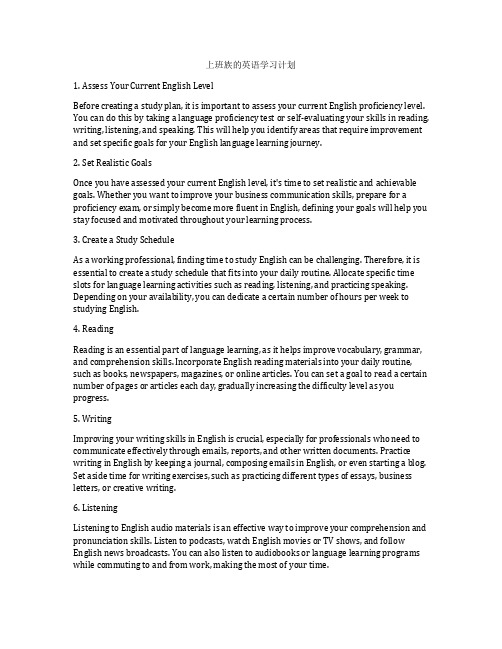
上班族的英语学习计划1. Assess Your Current English LevelBefore creating a study plan, it is important to assess your current English proficiency level. You can do this by taking a language proficiency test or self-evaluating your skills in reading, writing, listening, and speaking. This will help you identify areas that require improvement and set specific goals for your English language learning journey.2. Set Realistic GoalsOnce you have assessed your current English level, it's time to set realistic and achievable goals. Whether you want to improve your business communication skills, prepare for a proficiency exam, or simply become more fluent in English, defining your goals will help you stay focused and motivated throughout your learning process.3. Create a Study ScheduleAs a working professional, finding time to study English can be challenging. Therefore, it is essential to create a study schedule that fits into your daily routine. Allocate specific time slots for language learning activities such as reading, listening, and practicing speaking. Depending on your availability, you can dedicate a certain number of hours per week to studying English.4. ReadingReading is an essential part of language learning, as it helps improve vocabulary, grammar, and comprehension skills. Incorporate English reading materials into your daily routine, such as books, newspapers, magazines, or online articles. You can set a goal to read a certain number of pages or articles each day, gradually increasing the difficulty level as you progress.5. WritingImproving your writing skills in English is crucial, especially for professionals who need to communicate effectively through emails, reports, and other written documents. Practice writing in English by keeping a journal, composing emails in English, or even starting a blog. Set aside time for writing exercises, such as practicing different types of essays, business letters, or creative writing.6. ListeningListening to English audio materials is an effective way to improve your comprehension and pronunciation skills. Listen to podcasts, watch English movies or TV shows, and follow English news broadcasts. You can also listen to audiobooks or language learning programs while commuting to and from work, making the most of your time.7. SpeakingPracticing speaking is essential for improving your conversational skills in English. If possible, find a language exchange partner or join a conversation group to practice speaking with native English speakers. Alternatively, you can practice speaking with colleagues or friends who are also learning English. Set aside time for regular speaking practice to build confidence and fluency.8. Vocabulary and GrammarRegularly expanding your vocabulary and improving your grammar is crucial for language proficiency. Set aside time for vocabulary and grammar exercises, such as learning new words, reviewing grammar rules, and practicing with language learning apps or online resources. Focus on using newly learned words and grammar structures in daily conversations and writing activities.9. Seek Support and FeedbackJoining a language learning community or seeking support from a language tutor can be beneficial for working professionals. Engage with fellow learners, participate in language exchange events, or seek feedback on your language skills from experienced language instructors. Getting constructive feedback will help you identify areas for improvement and make necessary adjustments to your study plan.10. Monitor Your ProgressRegularly monitor your progress by assessing your language skills, revisiting your goals, and adjusting your study plan accordingly. Keep track of the improvements you've made in reading, writing, listening, and speaking, and celebrate your achievements along the way. Reflect on your learning journey and identify areas that require further attention and practice.In conclusion, as a working professional, it is possible to improve your English language skills by creating a well-structured study plan and dedicating time and effort to language learning activities. By incorporating reading, writing, listening, speaking, vocabulary, and grammar practice into your daily routine, you can gradually improve your English proficiency and achieve your language learning goals. Stay motivated and committed to your study plan, and remember that language learning is a journey that requires patience, practice, and dedication. Good luck!。
工作人员英语学习计划

工作人员英语学习计划With this in mind, I have developed a comprehensive English learning plan to help me achieve fluency and proficiency in the language. This plan includes a variety of strategies and resources that will allow me to continuously practice and improve my English skills, as well as measure my progress along the way.1. Set Clear GoalsThe first step in my English learning plan is to set clear and achievable goals. This will help me stay focused and motivated throughout the learning process. My goals include improving my speaking, listening, reading, and writing skills, as well as expanding my vocabulary and mastering various grammar rules. I will also set specific milestones and deadlines for each goal to ensure that I am making consistent progress.2. Utilize Language Learning AppsI plan to take advantage of language learning apps such as Duolingo, Rosetta Stone, and Babbel to practice my English skills on a daily basis. These apps provide interactive lessons, quizzes, and games that make learning fun and engaging. I will dedicate at least 30 minutes each day to using these apps to reinforce my English knowledge and expand my vocabulary.3. Engage in Language ExchangeOne of the most effective ways to improve my speaking and listening skills is to engage in language exchange with native English speakers. I will seek out language exchange partners through online platforms or local language exchange groups, and schedule regular meetings to practice conversational English. This will also provide me with valuable cultural insights and help me develop a more natural and fluent speaking style.4. Watch English Movies and TV ShowsTo improve my listening comprehension and expand my vocabulary, I will make it a habit to watch English movies and TV shows with subtitles. This will expose me to different accents, colloquial expressions, and idiomatic language usage, effectively enhancing my overall language proficiency. I will also take note of any unfamiliar words or phrases and incorporate them into my daily vocabulary practice.5. Read English Books and ArticlesRegular reading is essential for improving my reading and writing skills in English. I plan to set aside time each day to read English books, newspapers, and online articles on a variety of topics. This will not only help me become more familiar with English grammar and sentence structure, but also expose me to different writing styles and vocabulary usage. 6. Take English Classes or WorkshopsI will also consider enrolling in English classes or workshops to receive formal instruction and guidance from qualified teachers. These classes can provide me with structured lessons, personalized feedback, and opportunities for real-time practice and interaction. I will make an effort to actively participate in class discussions and complete any assigned homework or exercises to reinforce my learning.7. Seek Feedback and CorrectionIn order to continuously improve my English skills, I recognize the importance of receiving feedback and correction from others. I will ask for feedback from language exchange partners, teachers, and colleagues, and take note of any recurring mistakes or areas for improvement. I will also keep a journal to track my progress and reflect on my language learning journey.8. Practice RegularlyConsistent and regular practice is key to mastering any language. I will make it a priority to dedicate time each day to practicing my English skills, whether it is through speaking, listening, reading, writing, or a combination of these activities. I will also set aside time for focused study sessions to review grammar rules, learn new vocabulary, and work on language exercises.9. Use English in the WorkplaceLastly, I will actively seek opportunities to use English in my workplace. Whether it is through participating in English-speaking meetings, writing emails in English, or collaborating with international colleagues, I will look for ways to integrate English into my daily work routine. This will not only provide me with practical experience, but also help me overcome any language barriers in a professional context.10. Measure Progress and Adjust AccordinglyThroughout my English learning journey, I will regularly assess my progress and adjust my learning plan accordingly. I will set specific benchmarks and milestones to track my improvement, such as achieving a certain score on a language proficiency test or successfully completing a language challenge. Based on my performance, I will make any necessary adjustments to my learning methods and priorities.In conclusion, my English learning plan is designed to provide me with a comprehensive and systematic approach to improving my English language skills. By setting clear goals, utilizing various learning resources, and actively engaging in language practice, I am confident that I will be able to achieve fluency and proficiency in English, ultimately enhancing my professional and personal development.。
职场外语学习计划
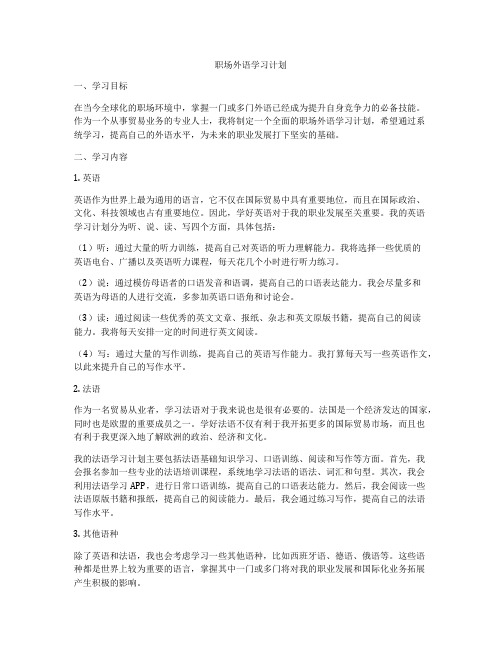
职场外语学习计划一、学习目标在当今全球化的职场环境中,掌握一门或多门外语已经成为提升自身竞争力的必备技能。
作为一个从事贸易业务的专业人士,我将制定一个全面的职场外语学习计划,希望通过系统学习,提高自己的外语水平,为未来的职业发展打下坚实的基础。
二、学习内容1. 英语英语作为世界上最为通用的语言,它不仅在国际贸易中具有重要地位,而且在国际政治、文化、科技领域也占有重要地位。
因此,学好英语对于我的职业发展至关重要。
我的英语学习计划分为听、说、读、写四个方面,具体包括:(1)听:通过大量的听力训练,提高自己对英语的听力理解能力。
我将选择一些优质的英语电台、广播以及英语听力课程,每天花几个小时进行听力练习。
(2)说:通过模仿母语者的口语发音和语调,提高自己的口语表达能力。
我会尽量多和英语为母语的人进行交流,多参加英语口语角和讨论会。
(3)读:通过阅读一些优秀的英文文章、报纸、杂志和英文原版书籍,提高自己的阅读能力。
我将每天安排一定的时间进行英文阅读。
(4)写:通过大量的写作训练,提高自己的英语写作能力。
我打算每天写一些英语作文,以此来提升自己的写作水平。
2. 法语作为一名贸易从业者,学习法语对于我来说也是很有必要的。
法国是一个经济发达的国家,同时也是欧盟的重要成员之一。
学好法语不仅有利于我开拓更多的国际贸易市场,而且也有利于我更深入地了解欧洲的政治、经济和文化。
我的法语学习计划主要包括法语基础知识学习、口语训练、阅读和写作等方面。
首先,我会报名参加一些专业的法语培训课程,系统地学习法语的语法、词汇和句型。
其次,我会利用法语学习APP,进行日常口语训练,提高自己的口语表达能力。
然后,我会阅读一些法语原版书籍和报纸,提高自己的阅读能力。
最后,我会通过练习写作,提高自己的法语写作水平。
3. 其他语种除了英语和法语,我也会考虑学习一些其他语种,比如西班牙语、德语、俄语等。
这些语种都是世界上较为重要的语言,掌握其中一门或多门将对我的职业发展和国际化业务拓展产生积极的影响。
上班族英语学习计划
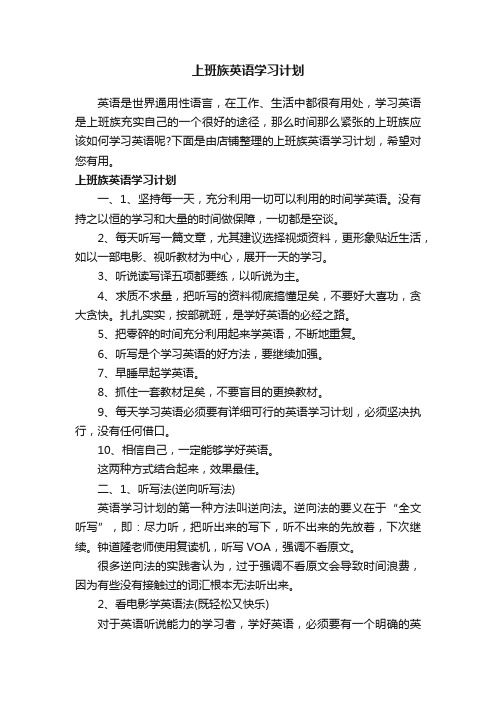
上班族英语学习计划英语是世界通用性语言,在工作、生活中都很有用处,学习英语是上班族充实自己的一个很好的途径,那么时间那么紧张的上班族应该如何学习英语呢?下面是由店铺整理的上班族英语学习计划,希望对您有用。
上班族英语学习计划一、1、坚持每一天,充分利用一切可以利用的时间学英语。
没有持之以恒的学习和大量的时间做保障,一切都是空谈。
2、每天听写一篇文章,尤其建议选择视频资料,更形象贴近生活,如以一部电影、视听教材为中心,展开一天的学习。
3、听说读写译五项都要练,以听说为主。
4、求质不求量,把听写的资料彻底搞懂足矣,不要好大喜功,贪大贪快。
扎扎实实,按部就班,是学好英语的必经之路。
5、把零碎的时间充分利用起来学英语,不断地重复。
6、听写是个学习英语的好方法,要继续加强。
7、早睡早起学英语。
8、抓住一套教材足矣,不要盲目的更换教材。
9、每天学习英语必须要有详细可行的英语学习计划,必须坚决执行,没有任何借口。
10、相信自己,一定能够学好英语。
这两种方式结合起来,效果最佳。
二、1、听写法(逆向听写法)英语学习计划的第一种方法叫逆向法。
逆向法的要义在于“全文听写”,即:尽力听,把听出来的写下,听不出来的先放着,下次继续。
钟道隆老师使用复读机,听写VOA,强调不看原文。
很多逆向法的实践者认为,过于强调不看原文会导致时间浪费,因为有些没有接触过的词汇根本无法听出来。
2、看电影学英语法(既轻松又快乐)对于英语听说能力的学习者,学好英语,必须要有一个明确的英语学习计划,看电影学英语是最佳的方法,因为电影或美剧的发音是最清晰的,语境生活化,适合练听力和模仿语音,只要认真地有兴趣的学习,那么效率一定是最高的,如果你能看透10-20部的电影或看几遍老友记,英文的听说读写能力会全面过关!看电影学英语五部曲:(以老友记为例来介绍):第一遍(听力):看双语(中英文)字幕和阅读影片台词,了解电影情节。
第二、三遍(听力):只看英文字幕,看不懂的地方根据影片剧情进行猜测。
上班族英语学习计划2篇
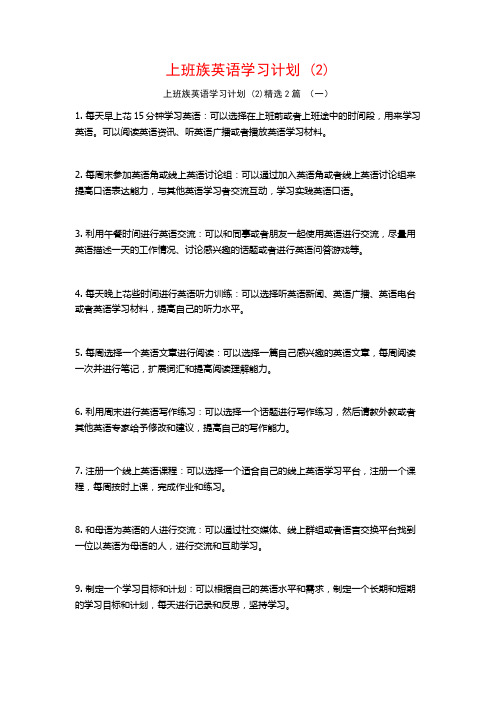
上班族英语学习计划 (2)上班族英语学习计划 (2)精选2篇(一)1. 每天早上花15分钟学习英语:可以选择在上班前或者上班途中的时间段,用来学习英语。
可以阅读英语资讯、听英语广播或者播放英语学习材料。
2. 每周末参加英语角或线上英语讨论组:可以通过加入英语角或者线上英语讨论组来提高口语表达能力,与其他英语学习者交流互动,学习实践英语口语。
3. 利用午餐时间进行英语交流:可以和同事或者朋友一起使用英语进行交流,尽量用英语描述一天的工作情况、讨论感兴趣的话题或者进行英语问答游戏等。
4. 每天晚上花些时间进行英语听力训练:可以选择听英语新闻、英语广播、英语电台或者英语学习材料,提高自己的听力水平。
5. 每周选择一个英语文章进行阅读:可以选择一篇自己感兴趣的英语文章,每周阅读一次并进行笔记,扩展词汇和提高阅读理解能力。
6. 利用周末进行英语写作练习:可以选择一个话题进行写作练习,然后请教外教或者其他英语专家给予修改和建议,提高自己的写作能力。
7. 注册一个线上英语课程:可以选择一个适合自己的线上英语学习平台,注册一个课程,每周按时上课,完成作业和练习。
8. 和母语为英语的人进行交流:可以通过社交媒体、线上群组或者语言交换平台找到一位以英语为母语的人,进行交流和互助学习。
9. 制定一个学习目标和计划:可以根据自己的英语水平和需求,制定一个长期和短期的学习目标和计划,每天进行记录和反思,坚持学习。
10. 尽量多使用英语:把平时的单词、短语和句子应用到实际场景中,例如购物、点餐、预订酒店等,用英语进行交流,提高自己的口语实践能力。
上班族英语学习计划 (2)精选2篇(二)上班族英语学习计划1. 设定明确的学习目标:确定你想要达到的英语水平,并分解为具体的学习任务和里程碑。
2. 每日英语练习:每天抽出一定的时间进行英语练习,可以选择阅读英文文章、听英文音频、看英文电影或剧集,或者进行口语练习。
3. 制定学习计划:安排每周的学习计划,确定每天要学习的内容和时间。
上班族英语学习计划初中

上班族英语学习计划初中1. Set realistic goalsThe first step in creating an effective English learning plan is to set achievable and specific goals. Whether your goal is to improve your speaking and listening skills for work, or to pass an English proficiency exam, it is important to clearly define what you want to achieve. For example, you may set a goal to learn 10 new words every week, or to practice speaking English for 30 minutes each day. By establishing clear and realistic goals, you can stay focused and motivated throughout your learning journey.2. Create a study scheduleOnce you have established your goals, it is essential to create a study schedule that fits into your daily routine. As a working professional, you may have limited free time, so it is important to make the most of the time you do have. Consider setting aside specific time slots each day for English learning, such as early in the morning before work, during your lunch break, or in the evening after dinner. By incorporating language learning into your daily schedule, you can build consistency and make steady progress over time.3. Focus on vocabulary buildingOne of the most important aspects of language learning is vocabulary building. As a working professional, you may encounter a wide range of vocabulary in your professional field, as well as in casual conversations with colleagues and clients. To improve your vocabulary, consider using various resources such as English vocabulary books, online flashcards, and language learning apps. Make it a habit to learn new words and phrases every day, and review them regularly to reinforce your memory.4. Practice grammar and writingIn addition to vocabulary building, it is crucial to practice grammar and writing skills in order to communicate effectively in English. Consider using grammar workbooks, online exercises, and language learning websites to practice different grammar concepts, such as verb tenses, prepositions, and sentence structure. Additionally, set aside time to practice writing in English, whether it be journaling, writing short stories, or composing emails in English. By consistently practicing grammar and writing, you can improve your overall language proficiency.5. Engage in speaking and listening exercisesAs a working professional, you may have opportunities to practice speaking and listening in English with colleagues, clients, or during business meetings. Take advantage of these opportunities to engage in conversations and actively listen to English speakers. Additionally, consider finding a language exchange partner or joining an English conversation group to practice speaking and listening outside of the workplace. By activelyengaging in speaking and listening exercises, you can improve your communication skills and confidence in using English.6. Utilize language learning resourcesIn today’s digital age, there are countless resources available for language learning, ranging from online courses and tutorials to language learning apps and podcasts. As a working professional, take advantage of these resources to supplement your English learning. Consider enrolling in an online language course, subscribing to an English language podcast, or using language learning apps to practice listening, speaking, and vocabulary. By utilizing various resources, you can tailor your learning experience to fit your specific needs and preferences.7. Stay motivated and track your progressFinally, it is important to stay motivated and track your progress throughout your English learning journey. Set aside time to reflect on your achievements and celebrate your milestones, whether it be mastering a difficult grammar concept, expanding your vocabulary, or successfully engaging in a conversation in English. Additionally, consider keeping a language learning journal to track your daily activities, record new words and phrases, and reflect on your language learning experiences. By staying motivated and tracking your progress, you can maintain a positive mindset and continue making strides in your English proficiency.In conclusion, as a working professional, it is possible to create a successful English learning plan by setting realistic goals, creating a study schedule, focusing on vocabulary building, practicing grammar and writing, engaging in speaking and listening exercises, utilizing language learning resources, and staying motivated and tracking your progress. By following this comprehensive plan, you can effectively improve your English language skills and achieve your language learning goals.。
上班族我的英语学习计划
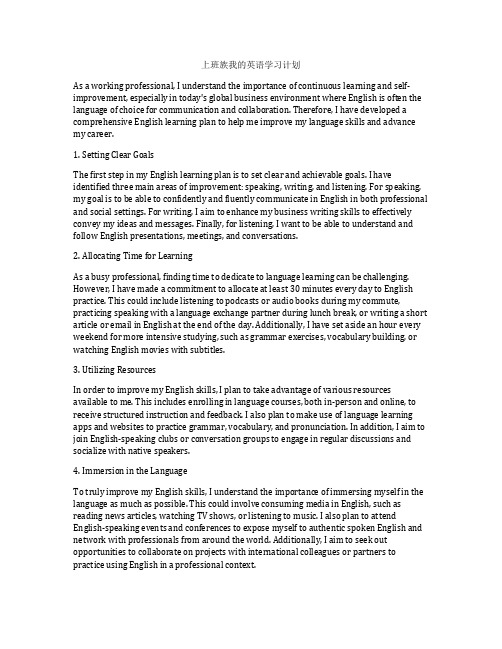
上班族我的英语学习计划As a working professional, I understand the importance of continuous learning and self-improvement, especially in today's global business environment where English is often the language of choice for communication and collaboration. Therefore, I have developed a comprehensive English learning plan to help me improve my language skills and advance my career.1. Setting Clear GoalsThe first step in my English learning plan is to set clear and achievable goals. I have identified three main areas of improvement: speaking, writing, and listening. For speaking, my goal is to be able to confidently and fluently communicate in English in both professional and social settings. For writing, I aim to enhance my business writing skills to effectively convey my ideas and messages. Finally, for listening, I want to be able to understand and follow English presentations, meetings, and conversations.2. Allocating Time for LearningAs a busy professional, finding time to dedicate to language learning can be challenging. However, I have made a commitment to allocate at least 30 minutes every day to English practice. This could include listening to podcasts or audio books during my commute, practicing speaking with a language exchange partner during lunch break, or writing a short article or email in English at the end of the day. Additionally, I have set aside an hour every weekend for more intensive studying, such as grammar exercises, vocabulary building, or watching English movies with subtitles.3. Utilizing ResourcesIn order to improve my English skills, I plan to take advantage of various resources available to me. This includes enrolling in language courses, both in-person and online, to receive structured instruction and feedback. I also plan to make use of language learning apps and websites to practice grammar, vocabulary, and pronunciation. In addition, I aim to join English-speaking clubs or conversation groups to engage in regular discussions and socialize with native speakers.4. Immersion in the LanguageTo truly improve my English skills, I understand the importance of immersing myself in the language as much as possible. This could involve consuming media in English, such as reading news articles, watching TV shows, or listening to music. I also plan to attend English-speaking events and conferences to expose myself to authentic spoken English and network with professionals from around the world. Additionally, I aim to seek out opportunities to collaborate on projects with international colleagues or partners to practice using English in a professional context.5. Monitoring Progress and Seeking FeedbackIn order to ensure that my English learning plan is effective, I will regularly monitor my progress and seek feedback from others. This could involve self-assessments of my language skills, such as recording myself speaking and analyzing areas for improvement. I also plan to ask for feedback from language teachers, language exchange partners, and colleagues on my language abilities and areas that need work. Based on this feedback, I will adjust my learning plan accordingly to address any weaknesses or gaps in my language skills.6. Celebrating Achievements and Staying MotivatedThroughout my English learning journey, I understand the importance of staying motivated and celebrating achievements, no matter how small. To keep myself motivated, I plan to set milestone goals and reward myself for reaching them, such as treating myself to a nice dinner or taking a weekend trip to an English-speaking destination. I also aim to stay connected with other language learners and share experiences and successes to support each other and stay inspired.In conclusion, as a working professional, I recognize the value of improving my English language skills for both personal and professional development. By setting clear goals, allocating time for learning, utilizing resources, immersing myself in the language, monitoring progress, and staying motivated, I am confident that I will make significant strides in my English proficiency. I am excited to embark on this learning journey and look forward to the opportunities and growth that it will bring to my career and life.。
- 1、下载文档前请自行甄别文档内容的完整性,平台不提供额外的编辑、内容补充、找答案等附加服务。
- 2、"仅部分预览"的文档,不可在线预览部分如存在完整性等问题,可反馈申请退款(可完整预览的文档不适用该条件!)。
- 3、如文档侵犯您的权益,请联系客服反馈,我们会尽快为您处理(人工客服工作时间:9:00-18:30)。
计划编号:YT-FS-8433-44
上班族英语学习计划(完
整版)
According To The Actual Situation, Through Scientific Prediction, Weighing The Objective Needs And Subjective Possibilities, The Goal To Be Achieved In A Certain Period In The Future Is Put Forward
深思远虑目营心匠
Think Far And See, Work Hard At Heart
上班族英语学习计划(完整版)
备注:该计划书文本主要根据实际情况,通过科学地预测,权衡客观的需要和主观的可能,提出在未来一定时期内所达到的目标以及实现目标的必要途径。
文档可根据实际情况进行修改和使用。
学习目标:
1.3个月能用英语进行普通的口语交流,6个月能
进行商务、技术类交流;
2.3个月能听懂voa慢速,6个月能听懂voa常
速;
3.单词量达到5000以上;
4.能进行公文、邮件、技术应用类文章的书写。
学习计划:
1.每天学习英语时间不小于2个小时,每周学习
时间不小于12个小时。
其中,考虑出差、工作等因素,
安排一天休息,学习天数每周6天,一天时间休息。
2.每天保证一定的听力的时间,至少15分钟的时
间,集中注意力,并有意识地去记忆好的句子。
3.日常思考的时候,尝试用英语思考、想问题以培养语感。
4.每天早上早起7:00听一段voa或者bbc的广播新闻,可以在上班路上听,时间不小于15分钟,建议听语速较快一点的文章。
5.每天中午12:30-13:15拿出45分钟用于观看美剧、纪录片等英语短片,也可背单词或句子。
6.每天晚上拿出1个小时进行英文听写,新概念英语背诵,单词记忆,口语练习等内容的学习。
7.每个周末对本周的学习情况进行总结和评论,并以周记的形式进行记录。
细则
听力:
1.从voa(specialenglish)做起。
每天听写1篇。
一定要坚持。
2.每周坚持看美剧,先从《绝望的主妇》开始。
初步定在每周6晚。
精读:
1.学习新概念英语2-3,背诵课文,每周不小于5篇。
2.重点领会作者的写作手法,记忆好的结构性的句子和内容性的句子,根据中文内容进行英文翻译,进行对比。
单词:
1.系统背诵四级词汇。
选用星火的四级词汇书。
每周3个wordlist,这样3个月时间可以全部背完。
词汇是重中之重,万万不可轻视!
2.利用手机软件背学过的新概念英语单词。
口语:
1.每天坚持听以及复述一段交际、商务英语,使用有道英语的对话教材。
2.每周找一个话题进行内容的编写和口述。
剑桥商务英语教程
语法:
主要还是靠使用中掌握,坚持写英语日记的话,会对语法和词汇都大有好处。
当然有一本语法书也是
很重要的。
这里填写您企业或者单位的信息
Fill In The Information Of Your Enterprise Or Unit Here。
